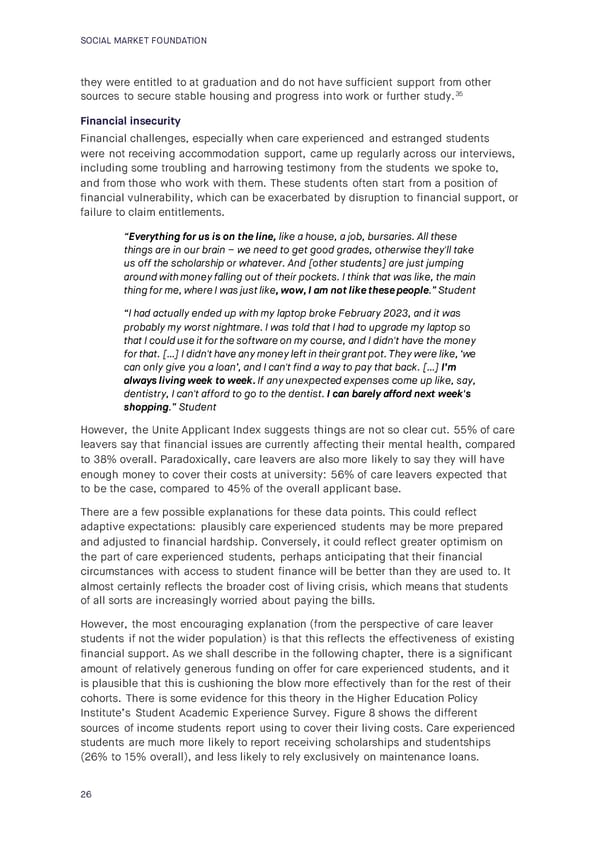SOCIAL MARKET FOUNDATION they were entitled to at graduation and do not have sufficient support from other sources to secure stable housing and progress into work or further study.35 Financial insecurity Financial challenges, especially when care experienced and estranged students were not receiving accommodation support, came up regularly across our interviews, including some troubling and harrowing testimony from the students we spoke to, and from those who work with them. These students often start from a position of financial vulnerability, which can be exacerbated by disruption to financial support, or failure to claim entitlements. “Everything for us is on the line, like a house, a job, bursaries. All these things are in our brain – we need to get good grades, otherwise they'll take us off the scholarship or whatever. And [other students] are just jumping around with money falling out of their pockets. I think that was like, the main thing for me, where I was just like, wow, I am not like these people.” Student “I had actually ended up with my laptop broke February 2023, and it was probably my worst nightmare. I was told that I had to upgrade my laptop so that I could use it for the software on my course, and I didn't have the money for that. […] I didn't have any money left in their grant pot. They were like, ‘we can only give you a loan’, and I can't find a way to pay that back. […] I’m always living week to week. If any unexpected expenses come up like, say, dentistry, I can't afford to go to the dentist. I can barely afford next week's shopping.” Student However, the Unite Applicant Index suggests things are not so clear cut. 55% of care leavers say that financial issues are currently affecting their mental health, compared to 38% overall. Paradoxically, care leavers are also more likely to say they will have enough money to cover their costs at university: 56% of care leavers expected that to be the case, compared to 45% of the overall applicant base. There are a few possible explanations for these data points. This could reflect adaptive expectations: plausibly care experienced students may be more prepared and adjusted to financial hardship. Conversely, it could reflect greater optimism on the part of care experienced students, perhaps anticipating that their financial circumstances with access to student finance will be better than they are used to. It almost certainly reflects the broader cost of living crisis, which means that students of all sorts are increasingly worried about paying the bills. However, the most encouraging explanation (from the perspective of care leaver students if not the wider population) is that this reflects the effectiveness of existing financial support. As we shall describe in the following chapter, there is a significant amount of relatively generous funding on offer for care experienced students, and it is plausible that this is cushioning the blow more effectively than for the rest of their cohorts. There is some evidence for this theory in the Higher Education Policy Institute’s Student Academic Experience Survey. Figure 8 shows the different sources of income students report using to cover their living costs. Care experienced students are much more likely to report receiving scholarships and studentships (26% to 15% overall), and less likely to rely exclusively on maintenance loans. 26
 Care and Learning in Higher Education Page 26 Page 28
Care and Learning in Higher Education Page 26 Page 28